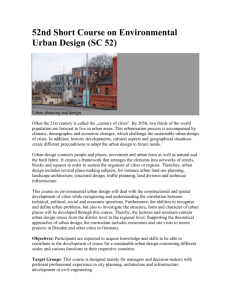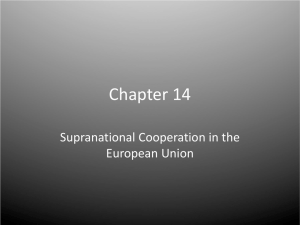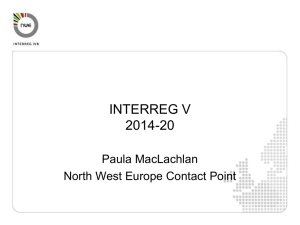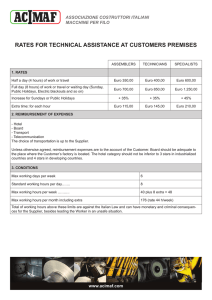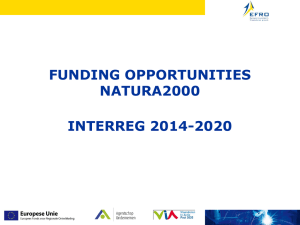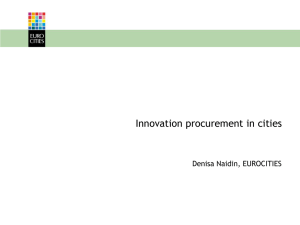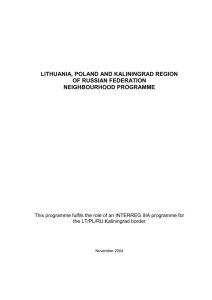DOC - Europa
advertisement
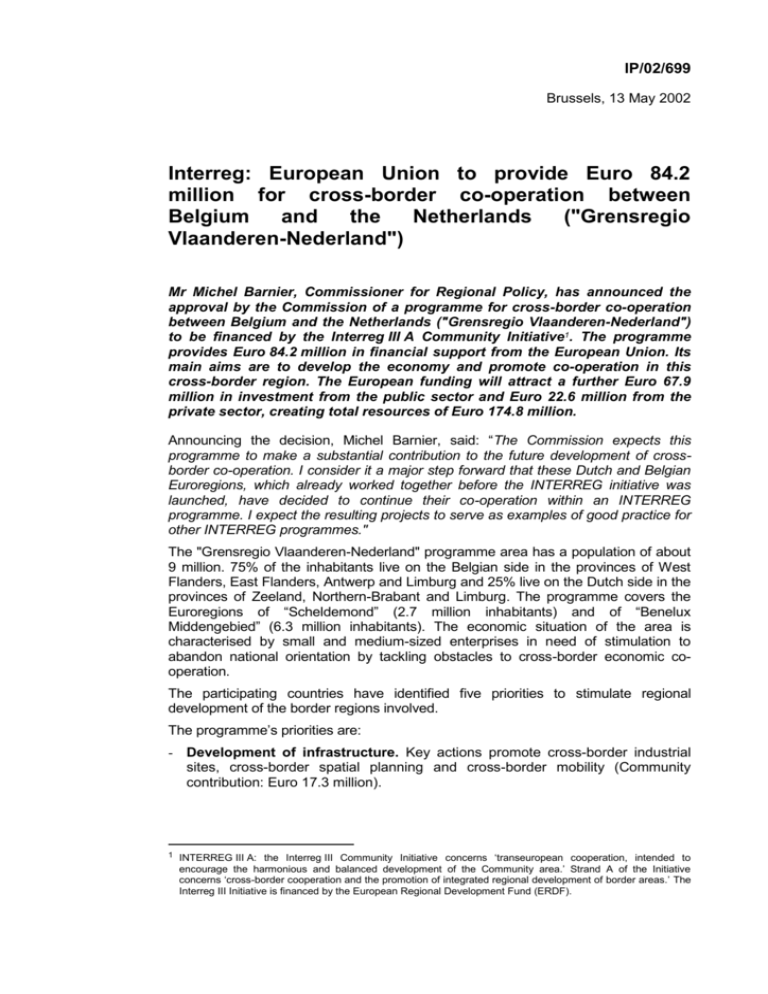
IP/02/699 Brussels, 13 May 2002 Interreg: European Union to provide Euro 84.2 million for cross-border co-operation between Belgium and the Netherlands ("Grensregio Vlaanderen-Nederland") Mr Michel Barnier, Commissioner for Regional Policy, has announced the approval by the Commission of a programme for cross-border co-operation between Belgium and the Netherlands ("Grensregio Vlaanderen-Nederland") to be financed by the Interreg III A Community Initiative1. The programme provides Euro 84.2 million in financial support from the European Union. Its main aims are to develop the economy and promote co-operation in this cross-border region. The European funding will attract a further Euro 67.9 million in investment from the public sector and Euro 22.6 million from the private sector, creating total resources of Euro 174.8 million. Announcing the decision, Michel Barnier, said: “The Commission expects this programme to make a substantial contribution to the future development of crossborder co-operation. I consider it a major step forward that these Dutch and Belgian Euroregions, which already worked together before the INTERREG initiative was launched, have decided to continue their co-operation within an INTERREG programme. I expect the resulting projects to serve as examples of good practice for other INTERREG programmes." The "Grensregio Vlaanderen-Nederland" programme area has a population of about 9 million. 75% of the inhabitants live on the Belgian side in the provinces of West Flanders, East Flanders, Antwerp and Limburg and 25% live on the Dutch side in the provinces of Zeeland, Northern-Brabant and Limburg. The programme covers the Euroregions of “Scheldemond” (2.7 million inhabitants) and of “Benelux Middengebied” (6.3 million inhabitants). The economic situation of the area is characterised by small and medium-sized enterprises in need of stimulation to abandon national orientation by tackling obstacles to cross-border economic cooperation. The participating countries have identified five priorities to stimulate regional development of the border regions involved. The programme’s priorities are: - Development of infrastructure. Key actions promote cross-border industrial sites, cross-border spatial planning and cross-border mobility (Community contribution: Euro 17.3 million). 1 INTERREG III A: the Interreg III Community Initiative concerns ‘transeuropean cooperation, intended to encourage the harmonious and balanced development of the Community area.’ Strand A of the Initiative concerns ‘cross-border cooperation and the promotion of integrated regional development of border areas.’ The Interreg III Initiative is financed by the European Regional Development Fund (ERDF). - Economic and technological co-operation. Key actions focus on strategic networking of small and medium-sized enterprises, access to innovation and the economic importance of tourism in the area (Community contribution: Euro 23.6 million). - Improvement of the environment. Special attention will be paid to overcome the risks of flooding and ground water pollution (Community contribution: Euro 20.4 million). - Qualification and labour market affairs. The programme will stimulate the development of a regional labour market by co-operation of all the labour market actors such as social partners, administrations and training centres (Community contribution: Euro 7.3 million); - Social integration. Key actions concern social inclusion especially for young people and the disabled, the stimulation of a regional cultural identity and cooperation in the field of health and public administration (Community contribution: Euro 10.1 million). There will also be a priority providing technical assistance for managing and monitoring the programme (Community contribution: Euro 5.5 million). The programme aims to involve some 250 organisations and 300 enterprises to participate and to realise some 100 socio-cultural activities. As with all INTERREG programmes, this programme will be funded by the European Regional Development Fund (ERDF) under the responsibility of Mr Barnier. Managing authority The managing authority for the programme is the Province of Antwerp. Implementation of the programme will be based on a partnership between the two countries drawn from national, regional and local administrations, as well as social and economic partners and non-governmental organisations. The managing authority will be assisted in day-to-day programme management by a Joint Technical Secretariat to be set up in Turnhout (Province of Antwerp). Koepelsecretariaat Grensregio Vlaanderen Nederland Secretaris Grensregio Vlaanderen – Nederland Mevr. Ita Joosten, Steenweg op Gierle 100 bus 660 B-2310 Turnhout Phone: +32 14/71 11 40, Fax: +32 14/71 11 49 Info: itajoosten@euregiobmg.com AngenitaJoosten@hotmail.com Background With a budget of €4 875 million for the period 2000-06, the Interreg III Community Initiative aims to encourage transeuropean co-operation in the EU and its border regions. It is financed by the European Regional Development Fund (ERDF). Interreg III programmes finance cross-border, transnational and interregional cooperation measures through joint projects to improve the economy, infrastructure, employment and the environment. The European Commission adopts bilateral or multilateral programmes, which must be proposed by the designated national and regional authorities. 2 Additional information For further information, please consult memo 01/280 of 25 July 2001 and the following Commission website: http://www.europa.eu.int/comm/regional_policy/interreg3/index_fr.htm 3
